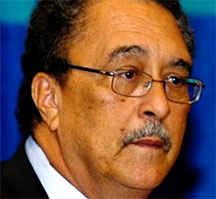St Lucia’s Prime Minister Dr Kenny Anthony has rejected criticisms by the US that his government has failed to prosecute police for extrajudicial killings and laid the blame on the island’s Office of the Director of Public Prosecutions (DPP).
On January 12th, the US Embassy for Barbados and the Eastern Caribbean issued a statement accusing Anthony’s administration of not acting over the 2010-11 killing of suspected criminals at the height of a crime wave during which the law enforcers were also accused of drawing up death lists. Twelve people were killed during the period and Washington suspended aid to the island’s police force and barred some of its top officers from travelling to the United States.

Yesterday, Anthony in a statement released by his office rejected the US suggestion that the absence of progress was attributable to his government or inaction on his part. He said that the Executive’s role was fulfilled upon the presentation of the CARICOM Implementation Agency for Crime and Security Report to the DPP’s office in March 2015. That report had made damning findings against the St Lucian police.
The PM noted that the DPP herself acknowledged that she had not read the report until six months following its receipt. He added that up to the point that she proceeded on pre-retirement leave in December last year the DPP had not asked the government to facilitate her receiving witness statements or interviewing investigators on the island or from Jamaica who had investigated the allegations against the police.
Anthony further said that the accusation that the DPP’s office had not been provided with adequate resources had been debunked. He said that the government had made provision in the 2015/16 budget for the appointment of two special prosecutors to assist her if deemed necessary but the DPP never made use of these resources.
“The truth is that never in the history of the DPP’s office has it been as well-staffed as it was at that time with only the position of Deputy Director of Public Prosecutions remaining vacant. Even then, the Government of Saint Lucia had placed advertisements in the local and regional papers to fill the position on several occasions. The Judicial and Legal Services Commission decided that none of the applicants were suitable to fill the vacant post.
“It must be noted here that appointments to the positions of Director of Public Prosecutions and Deputy Director of Public Prosecutions are made not by the Executive but instead by the Judicial and Legal Services Commission, a body established under Saint Lucia’s Constitution which is, therefore, outside the purview and influence of the Executive Branch of the Government.”
